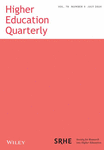Published by: Wiley
Frequency: Four issues per year
Print ISSN: 0951-5224
Online ISSN: 1468-2273
Higher Education Quarterly
Higher Education Quarterly occupies a critical space in promoting research into higher education policy and practice internationally. Its remit includes, for instance, institutional approaches to the student experience, management and leadership; system-wide issues such as student funding and widening participation; and international responses to global market environments. It places particular emphasis on comparative material as opposed to single institution or local case studies.
The journal is unique in bringing together issues arising from academic policy and practice and thereby serving a broadly based readership.
SRHE Members can access all issues of HEQ via ‘Login’ (top right of screen) > My Account > Access to HE journals > Wiley online Library.
Editor in Chief: Dr João M. Santos
Instituto Universitário de Lisboa (ISCTE-IUL), Portugal
Associate Editor: Dr Jana Berg
German Center for Higher Education Research and Science Studies, Germany
Associate Editor: Dr Debananda Misra
Indian Institute of Technology Delhi, India
Associate Editor: Dr Bariş Uslu
Çanakkale Onsekiz Mart University, Turkey
Associate Editor: Dr Lili Yang
The University of Hong Kong, Hong Kong
Keep up to date
You can keep up to date with Higher Education Quarterly using both RSS Feed and Email Alerts. To receive RSS feed, you will need to use an aggregator or news reader. Most modern internet browsers have one. Email alerts are send when new issues become available.
To set up RSS Feed and Email Alerts, simply navigate to the link below and click on the RSS or Email icon. Email Alerts require registration whereas RSS feed does not.
This will notify you to new content published in the journal.


